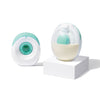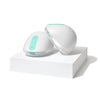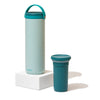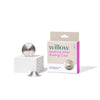The World Health Organization (WHO) encourages all mothers to continue breastfeeding, including those with confirmed or suspected COVID-19. While the pandemic has halted some activities in our day-to-day lives, breastfeeding should not be one of them. Continuing to feed helps your little one grow strong and gives you two proper bonding time that are crucial in those early stages of life.
It’s probably crossed your mind at one point whether or not breastfeeding with the virus is safe. That is just one of your many great motherly instincts. Thankfully, studies have yet to identify breastfeeding as a transmission source from an infected mother to a child or vice versa. So get close and comfy with your baby —the WHO recommends it.
While breastfeeding is considered safe with COVID-19, there are some things you should keep in mind. Scroll below and learn how to breastfeed your baby during a pandemic and what to do to keep them safe.
Things to Remember While Breastfeeding During a Pandemic
The best food you can give your infant is breast milk. It is packed with love and nutrients that strengthen their body to fight off illness and germs. So while we may need to keep our distance from others, you can keep your baby close.
Here are some of our best tips to remember when breastfeeding:
Benefits of Breastfeeding Outweighs Potential Risk of Infection
Studies have shown that breastfeeding with COVID-19 gives babies some immunity to the virus. In one particular study, 15 milk samples were analyzed from COVID-19 patients. The study found that 12 contained IgA and IgG. These two particular antibodies have been found to reduce the infection rate of SARS-CoV-2 (whew!) and is the reason why breastfeeding protects infants by giving them passive immunity.
Another study — also collecting breast milk — was done in 2017. After close analysis, researchers found that the whey protein in the samples prevented activities in Coronavirus particles.
Whey protein can effectively limit the entry and growth of the virus, which also might explain why even mothers infected with COVID-19 don't have viral particles in their breast milk.
COVID-19 Antibodies Pass Through Breastmilk
However, stopping regular breastfeeding can make things even harder. This is because your baby may reject the breast over time and there will definitely be a reduction in milk production.
Why is this? The more milk leaves your breasts, the more the body replenishes what is lost. Classic, supply and demand (oh, ECON 101.) So, if you are not pumping regularly or breastfeeding, your body will begin to produce less and less milk every time.
What if I develop COVID-19 during pregnancy, after birth, or while breastfeeding? While your instincts tell you to keep your distance from your baby, continuing to breastfeed actually has a considerable advantage.
When your body comes under attack with diseases, it produces antibodies. These antibodies flow through you, into your milk, and then to your baby. The nutrients from breast milk helps them grow strong, while the antibodies boost their immune system. Time and time again, studies have shown antibodies fight off other illnesses too.
Just Because You're Vaccinated, Doesn't Mean Your Baby Is
Getting vaccinated during breastfeeding is a great idea. As your body builds up immunity to the virus, it releases antibodies found in breast milk. As we are still learning about COVID-19, we know it can take some time to become immune to the virus.
Since this is the case, other precautions should be taken as well. It is still possible for your baby to contract the virus through respiratory droplets or contact.
When in Doubt, Wear a Mask
Being unsure is never a bad thing. Sometimes, it's the uncertainty that helps us make good decisions. In fact, the CDC recommends that if you are unsure of your COVID-19 status, wearing a mask to breastfeed, pumping milk, or being within six feet of your little one can prevent respiratory droplets from spreading to your child.
Stay in the Know with Willow
Breastfeeding is one of the best ways you can show love and care for your baby, while building their immunity up too.
Key takeaways:
- First, confirm your negative COVID status, and while you wait, wear a mask.
- If you feel sick and don't want to risk your precious one’s health, don't resort to formula just yet…Instead, pump breast milk and have someone you trust and in good health bottle feed your baby.
- Finally, be consistent with safe breastfeeding — it’s the one sure way for them to get the nutrients they need.
In these times of question, it’s essential to have the most up-to-date answers. We are here every step of the way to make your amazing journey of being a mom that much easier.

















